Original Author: BitpushNews
What was supposed to be the "highlight moment" for the crypto industry in Washington - "Crypto Week" - encountered a setback on Tuesday, as three crypto regulatory bills pushed by Trump unexpectedly "derailed" in a procedural vote.
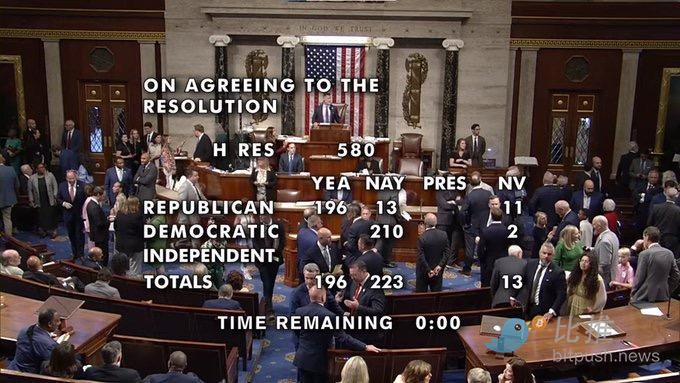
Tuesday's vote ended with 196 votes in favor and 223 votes against. Thirteen Republican representatives joined Democrats in voting against the motion, collectively blocking the procedural move to debate and advance the bill.
This means that unless the House passes new procedural rules, these bills carrying industry hopes will not enter substantive debate.
The "Crypto Week" Vision: Trump Personally Overseeing
Earlier this week, the crypto industry in Washington was optimistic, with widespread expectations that these bills would pass smoothly.
Trump himself championed "Crypto Week" on his "Truth Social" platform, portraying it as a key step for the United States to become the "undisputed, number one leader" in digital assets. He called on all Republican representatives to vote in favor, believing that the GENIUS bill would put the country "light-years ahead of China, Europe, and all other countries, who are endlessly trying to catch up but just can't do it."
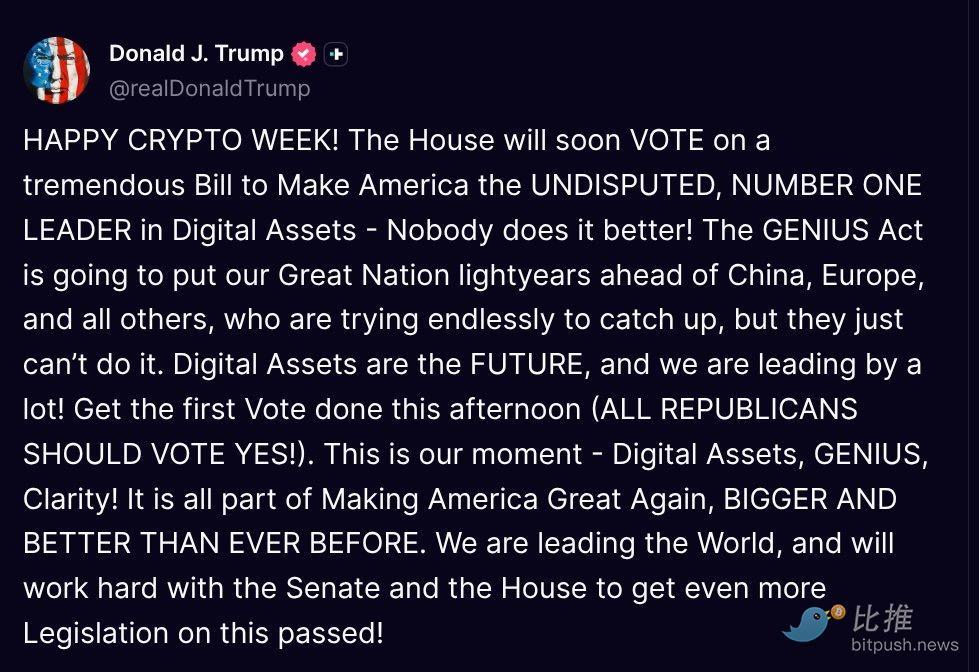
The blocked crypto legislative "package" included three critically important bills for the industry:
GENIUS Bill: This stablecoin regulation bill was partially supported by Democrats in the Senate last month. It aims to provide a clear regulatory framework for stablecoins and is seen as a key to unlocking broader institutional adoption.
CLARITY Bill: This bill seeks to clarify digital asset classification rules, specifying which assets should be regulated as securities by the SEC and which should be regulated as commodities by the CFTC, ending the long-standing "regulatory gray area" that has troubled the industry.
Central Bank Digital Currency (CBDC) Prohibition Bill: This proposal aims to prevent the Federal Reserve from creating a central bank digital currency, reflecting some lawmakers' concerns about government control of digital currencies.
These bills were viewed as the cornerstone of establishing a comprehensive and predictable regulatory framework for digital assets in the United States, and their passage could have brought long-awaited certainty to the market, attracting more capital and innovation.
Dissent Emerges Within the Republican Party
The most notable aspect of this vote was the "betrayal" by 13 Republican representatives. According to The Hill, several Republican representatives, including Marjorie Taylor Greene, Chip Roy, Michael Cloud, and Anna Paulina Luna, voted against the bill.
Marjorie Taylor Greene from Georgia publicly explained her stance on social media.
She stated that the GENIUS Bill failed to include a prohibition on central bank digital currencies (CBDC), and Speaker Johnson did not allow the submission of related amendments. Greene emphasized that Trump's executive order from January 23rd already included a CBDC ban, and therefore Congress must also incorporate it into the GENIUS Bill, believing that "Americans do not need a government-controlled central bank digital currency".
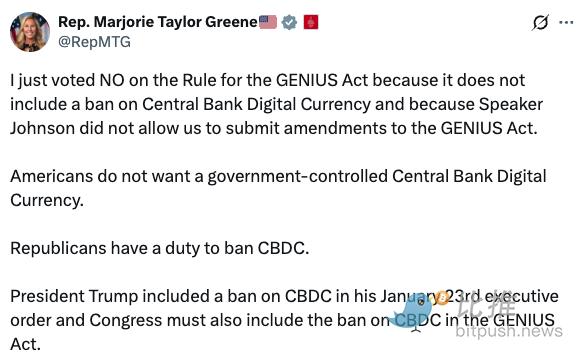
House Speaker Johnson is now caught in a dilemma. After the vote failed, he stated that Republicans are "still in conversation, addressing doubts" in an attempt to appease and win support from these conservatives.
However, he also candidly admitted that bundling all three bills (especially the stablecoin bill already passed by the Senate and the CBDC prohibition bill demanded by hardliners) into a "package" is not feasible. A senior Republican representative directly stated: "Voting on the package would only kill these bills in the Senate." This reflects the strategic dilemma faced by Republican leadership in balancing different party faction demands and ensuring legislative viability.
Subsequent Vote Suspense: Compromise or Deadlock?
After the news of the failed vote, crypto-related stocks immediately dropped: Circle's stock fell over 7%, crypto exchange Coinbase dropped over 4%, and digital asset company MARA Holdings' stock fell 2%.
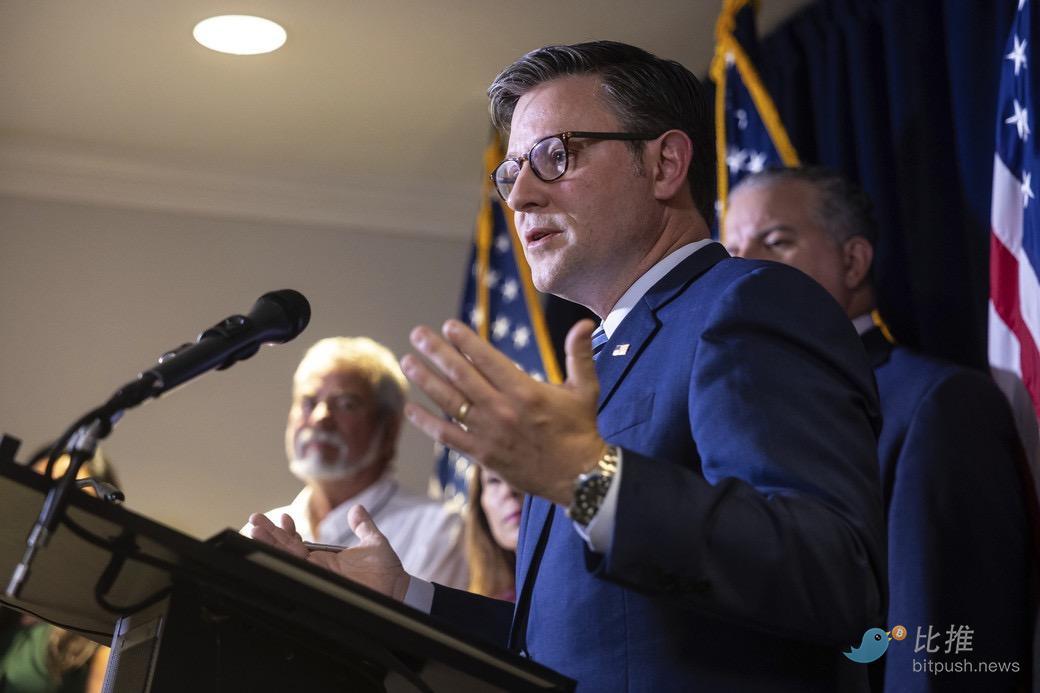
House Speaker Johnson has announced hopes to restart the procedural vote on crypto legislation on Wednesday local time. The Louisiana Republican told reporters as he left the Capitol that the party is still "continuously communicating and addressing member concerns" and emphasized that "these crypto bills are a joint priority of the White House, Senate, and House". According to Fox News, Trump himself is "angry" about the vote result and is communicating with relevant representatives.
Nevertheless, some industry analysts remain optimistic about the bills' future. TD Cowen policy analyst Jaret Seiberg noted in a client report: "We are likely to have another House vote on the rules tomorrow (Wednesday). If it doesn't happen tomorrow, it might be delayed until next week." Seiberg further stated that he still expects the House to pass the GENIUS Bill, primarily because "Trump is pushing for its implementation". He believes that even if the House Freedom Caucus members oppose accepting the Senate version of the bill, they may ultimately compromise under the president's request.
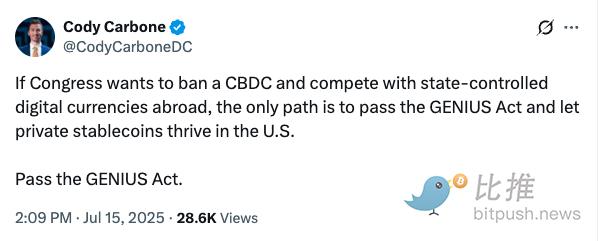
Digital Chamber CEO Cody Carbone is also confident about the bill's eventual passage. He pointed out on social media that the best way to address CBDC prohibition is through the GENIUS Bill: "If lawmakers are interested in banning CBDC and competing with digital currencies issued by other countries, the way to do this is through the GENIUS Bill and allow the private stablecoin market to flourish in the United States."
This setback confirms a reality: in Washington, even a presidential-backed agenda can be defeated by subtle party power dynamics. When technological innovation meets political maneuvering, the "compliance path" of cryptocurrencies is destined to be far from smooth.




